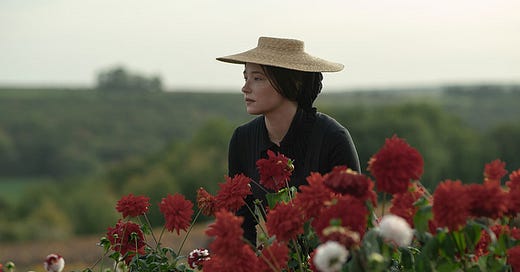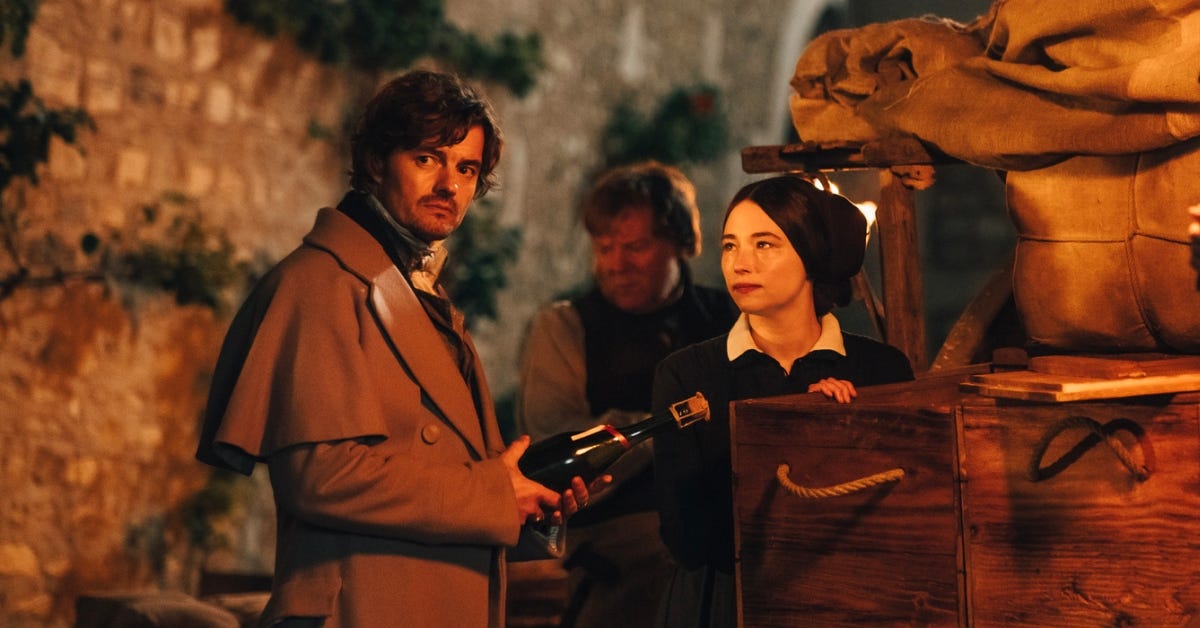TMS Movie Review: Widow Clicquot
(4th & 28 Films / Vertical Entertainment)
For those who were disappointed by the lack of kissing in Lee Isaac Chung’s Twisters, you won’t be with Thomas Napper’s Widow Clicquot. That is if costume dramas are your thing. Like the current blockbuster, Clicquot is about a career driven woman torn between two men in extreme circumstances. Only this time it’s the turn of the 19th century and there is much more drama than action and lots of romantic yearning in between. Napper’s new film is based on the woman behind the success of France’s Veuve-Clicquot wine company, Barbe-Nicole Ponsardin-Clicquot, here portrayed by Haley Bennett, and her fight to keep her deceased husband’s family legacy alive.
Bennett, the sole American on screen, might seem like she’s out of place in a cast full of Brits playing French citizens, but impressively leads the period piece. Told in non-linear format from the 1790s to 1810s, we see Barbe-Nicole’s troubled marriage to her emotionally disturbed husband, François Clicquot (Tom Sturridge), and her battle with both her father-in-law, Philippe (Ben Miles), and the French government to save the Clicquot’s failing wine vineyard after the sudden death of François. While passionately maintaining the process and tasks to make the best tasting wine in Europe, Barbe becomes intimately close to her merchant, Louis Bohne (Sam Riley), who was also François’ best friend. Leo Suter, Natasha O’Keeffe and Anson Boon play some of Clicquot staff and Cara Seymour makes an appearance as Barbe’s mother.
(4th & 28 Films / Vertical Entertainment)
Widow Clicquot is adapted by Erin Dignam from Tilar J. Mazzeo’s 2008 biography with the same title and co-produced by Bennett’s longterm boyfriend Joe Wright. Napper, who is also Wright’s former assistant director, clearly has an eye for the camera and knows how to effectively take us back to the Napoleonic War era. The tone and atmosphere are typical for a UK produced costume drama and may scratch that itch for those who enjoy the sweepingly romantic. Story wise, Clicqout is part feminist success story and part weepy melodrama, to mixed viewer reactions. Some wish it focused solely on Barbe’s impact on the wine industry, while some wanted more of the love triangle. For me, the execution worked fine, and I appreciated seeing a lady be dedicated to both business and relationships. Bennett, who has always been a bit overlooked in her generation of actors, pulls off not only the accent but channeling the type of strong woman who would be found this far in the past. Torn between proving she can be the leader of a vineyard but also honoring her beloved husband’s memory. It’s a nice bonus that an actress with a curvier figure was cast in a sensual role too, especially in a period drama. Sturridge and Riley are both fine as the love interests of opposite personas, with François as artistic and moody and Louis as charming and sophisticated.
With the exception of a young daughter of Barbe & François who seemingly disappears in the middle of the movie, Widow Clicqout is a nice addition to the current string of cinematic romance & passion.





